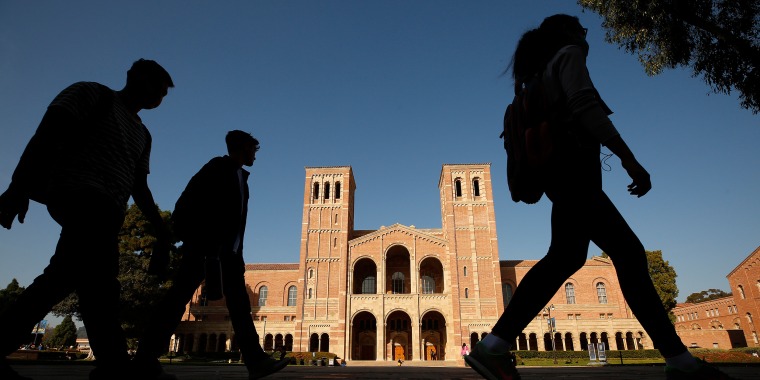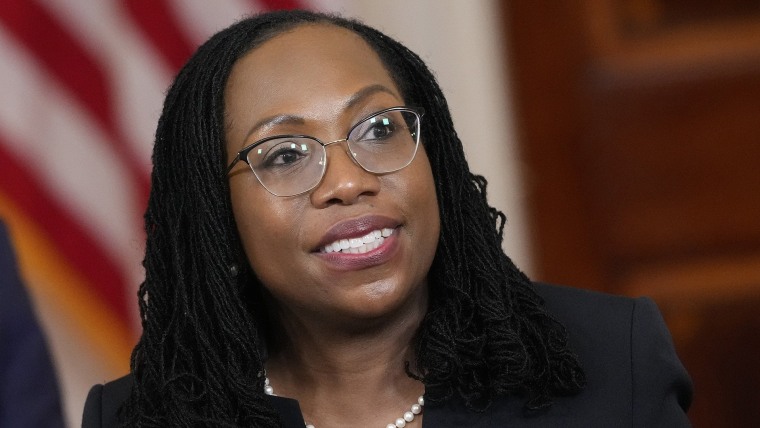The fate of affirmative action policies, specifically the ability of colleges to consider race during admissions decisions, may hang in the balance this fall when the Supreme Court hears a case from Students for Fair Admissions, a nonprofit organization led by Edward Blum, alleging that Harvard University's admissions policies discriminate against Asian American applicants "and give unlawful and unfair preferences to white, Hispanic and Black applicants."
If recent developments are any indication, it won’t matter if Judge Jackson is confirmed; the conservative-leaning court will likely bring an end to affirmative action on college campuses.
Some conservatives expressed alarm at Judge Ketanji Brown Jackson’s nomination to the Supreme Court, in part because President Joe Biden promised his nominee would be a Black woman but also because she, an alumna of Harvard and Harvard Law, has served on Harvard’s Board of Overseers since 2016.
Wednesday, during the third day of Judge Jackson's confirmation hearing, in response to a question from Sen. Ted Cruz, R-Texas, she indicated that if she's seated on the Supreme Court that she intends to recuse herself from the case filed by Students for Fair Admissions.
If recent developments are any indication, Jackson's recusal makes it more likely than it already was that the conservative court will bring an end to affirmative action on college campuses or, at the very least, significantly limit its use and, thus, widen the educational and economic inequality that affirmative action policies were designed to help redress.
“Affirmative Action, Mismatch, and Economic Mobility after California’s Proposition 209,” a study by labor economist Zachary Bleemer published last month in The Quarterly Journal of Economics, uses data from 1994 to 2002 to shed new light on the impact of California’s Proposition 209, a ban on race-based affirmative action policies that went into effect in 1998. Bleemer, a postdoctoral fellow at Opportunity Insights at Harvard University and an incoming assistant professor of economics at Yale University, told me his study “shows that ending affirmative action had sharp negative educational and labor market ramifications for young Black and Hispanic Californians from across the distribution of academic preparation.” Based on his computations, Bleemer observed that “overall, Prop 209 resulted in a net outflow of lower-income students from highly selective public universities.”
Following the implementation of Proposition 209 in 1998, the state witnessed a 14 percent drop in underrepresented students' enrollment in California’s university system. In addition, Bleemer’s study also reveals that it caused a “cascade of students to enroll at lower-quality public institutions.” But not only that; Bleemer’s study found Proposition 209 reduced the number of underrepresented minority students on college campuses in California. It also found that it had a negative impact on the earning potential of graduates of color. In short, Proposition 209 deepened economic inequality.
“I was interested in what happened when California radically reshuffled who was provided access to its selective public universities,” Bleemer told me. The study, he explained, made it possible for him to “track impacted students in the data — both the ‘winners’ and the ‘losers’ of the policy change — to see how their lives were changed because they were pushed or pulled into different universities.”
In the short term, the data revealed that Black and Hispanic students did not thrive in less-selective institutions. For example, they were less likely to complete their undergraduate degrees. They also earned fewer STEM (science, technology, engineering and math) degrees and were less likely to pursue graduate study.
In the long-term, Black and Hispanic college students in California experienced less social mobility and limited earning potential; in other words: significant financial harm. Referring to underrepresented minorities, Bleemer said his study “suggests that affirmative action both promotes socioeconomic mobility among URM youths and improves higher education’s allocative efficiency.”
Universities also faced economic repercussions. Though several schools increased their outreach to communities of color in an attempt to offset the elimination of affirmative action policies, the data show that outreach did not effectively counteract the drop in enrollment, which means those universities lost money.
Bleemer’s findings have broad implications for the nation, suggesting as they do that banning affirmative action would negatively impact students of color and deepen the racial wealth gap. While Bleemer admits that his new study “has little to say about the fairness of affirmative action policies,” he emphasizes the study’s “bevy of evidence that banning affirmative action reduces both the equity and efficiency of college admissions protocols.”
It's important that we acknowledge the significance affirmation action policies have had.
Bleemer’s study demonstrates how affirmative action policies can help to level the playing field, expanding financial opportunities for people of color — without somehow limiting opportunities for others. “California has at least 3 percent fewer high-earning young Black and Hispanic workers today than it would have had if it hadn’t banned affirmative action,” Bleemer said, “and its public universities have become less efficient as a result of their rejecting so many students whose benefits from enrollment would exceed those obtained by the students who currently enroll at those schools.”
As affirmative action and Jackson endure scrutiny, it’s important that we acknowledge the significance that affirmative action policies have had and how society suffers when we miss the mark on meeting the larger goals of diversity, equity and inclusion.


